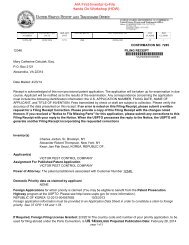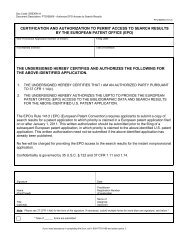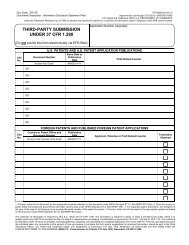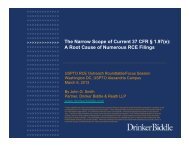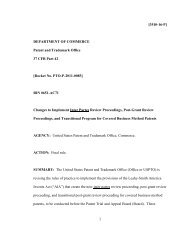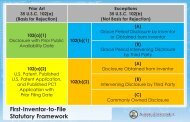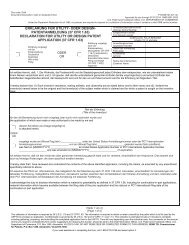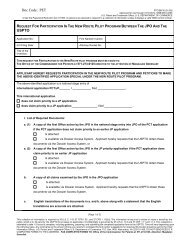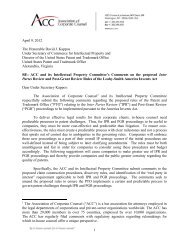USPTO Performance and Accountability Report - U.S. Patent and ...
USPTO Performance and Accountability Report - U.S. Patent and ...
USPTO Performance and Accountability Report - U.S. Patent and ...
You also want an ePaper? Increase the reach of your titles
YUMPU automatically turns print PDFs into web optimized ePapers that Google loves.
42<br />
MANAGEMENT’S DISCUSSION AND ANALYSIS<br />
Improving Enforcement <strong>and</strong> Providing<br />
Capacity Building <strong>and</strong> Technical Assistance<br />
to Key Countries/Regions<br />
A key challenge with overseas IP enforcement is the<br />
need to increase awareness, skills, <strong>and</strong> resources of<br />
foreign enforcement officials. To improve enforcement<br />
in high-priority countries <strong>and</strong> regions, the<br />
<strong>USPTO</strong> has developed rigorous capacity-building<br />
programs for foreign enforcement officials, including<br />
police <strong>and</strong> investigators, prosecutors, border<br />
enforcement officials, as well as the judiciary.<br />
The <strong>USPTO</strong> has taken an active role in working with<br />
foreign judiciaries <strong>and</strong> prosecutors to increase their<br />
underst<strong>and</strong>ing of IP issues through direct training<br />
<strong>and</strong> exchanges with U.S. officials, including U.S.<br />
judges <strong>and</strong> prosecutors who are experts in h<strong>and</strong>ling<br />
IP cases. The <strong>USPTO</strong>’s IP enforcement programs are<br />
also designed to address overarching rule-of-law as<br />
well as court administration concerns in foreign<br />
countries, by encouraging an environment of better<br />
consistency <strong>and</strong> predictability for IP litigants, which<br />
may have the added benefit of lowering litigation<br />
costs resulting from more efficient adjudication<br />
processes.<br />
The <strong>USPTO</strong> <strong>and</strong> U.S. Court of Appeals for the Federal<br />
Circuit (CAFC) held a joint program in Beijing, China<br />
on IP adjudication with the Supreme People’s Court<br />
of China. This brought together over 1,500 participants<br />
from a number of different countries <strong>and</strong><br />
featured remarks by Chief Judge Rader <strong>and</strong> all of<br />
the judges from the CAFC, <strong>USPTO</strong> Director David<br />
Kappos, <strong>and</strong> many other Chinese <strong>and</strong> U.S. officials.<br />
The Beijing conference was followed by visits by the<br />
CAFC judges to Guangzhou <strong>and</strong> Shanghai, where<br />
they met with local judges <strong>and</strong> IP officials.<br />
The <strong>USPTO</strong> also partnered with the CAFC as well as<br />
the Federal Judicial Center to host approximately 50<br />
U.S. Federal judges from throughout the country for<br />
a program on the <strong>Patent</strong> Application Examination<br />
Process, <strong>Patent</strong> Reexamination, <strong>and</strong> Post-Grant<br />
Proceedings. The participants were part of the<br />
recently launched <strong>Patent</strong> Pilot Project, designed to<br />
strengthen patent law expertise among judges.<br />
PERFORMANCE AND ACCOUNTABILITY REPORT: FISCAL YEAR 2012<br />
Combating the proliferation of counterfeit medicines<br />
is a training priority. The <strong>USPTO</strong> organized a series of<br />
workshops in Indonesia <strong>and</strong> Jordan. The U.S. Food<br />
<strong>and</strong> Drug Administration, U.S. Department of Justice,<br />
<strong>and</strong> the U.S. Immigration <strong>and</strong> Customs Enforcement,<br />
Homel<strong>and</strong> Security Investigations participated in<br />
the workshops.<br />
The <strong>USPTO</strong> convened four roundtables (three in<br />
China <strong>and</strong> one in the U.S.) with U.S. industry representatives<br />
<strong>and</strong> published a Federal Register notice<br />
to solicit input on their experiences enforcing patents<br />
in China. The input received has been compiled<br />
into a report, which was published on the <strong>USPTO</strong>’s<br />
website. The report will help guide the <strong>USPTO</strong>’s<br />
engagement with China on patent enforcement.<br />
The GIPA offers training programs on protection, utilization,<br />
<strong>and</strong> enforcement of IP rights including<br />
patents, trademarks, <strong>and</strong> copyrights. As demonstrated<br />
in Table 16, it is through the GIPA training<br />
programs that the <strong>USPTO</strong> is instrumental in achieving<br />
its objectives of advancing IP policies. Note that the<br />
FY 2012 results did not exceed the anticipated<br />
target. This was largely due to the emergent nature<br />
of the supporting goal itself. The baseline was established<br />
in 2011 based on the launch of GIPA’s threepart<br />
survey methodology. A target was selected<br />
from a sampling of capacity building programs.<br />
The sampling for FY 2012 programs included two<br />
WIPO workshops that included students, but not<br />
foreign government officials. This somewhat skewed<br />
the evaluative efficacy of survey responses regarding<br />
the impact of the programs on the participants’<br />
work. Another program using the survey process<br />
was on a very narrow topic, which may also have<br />
caused an outlier effect on the results. To improve<br />
on both the methodology <strong>and</strong> enhance the value<br />
of the supporting performance metric, GIPA intends<br />
to apply the lessons learned from this initial round<br />
into the next fiscal year <strong>and</strong> apply the surveys to a<br />
larger pool of more diverse programs.<br />
TABLE 16 Supporting Measure: Percentage of foreign<br />
officials trained who have initiated or implemented<br />
a positive change in the IP systems in their organizations<br />
<strong>and</strong>/or countries<br />
FISCAL YEAR TARGET ACTUAL<br />
2011 Baseline 79%<br />
2012 75% 69%


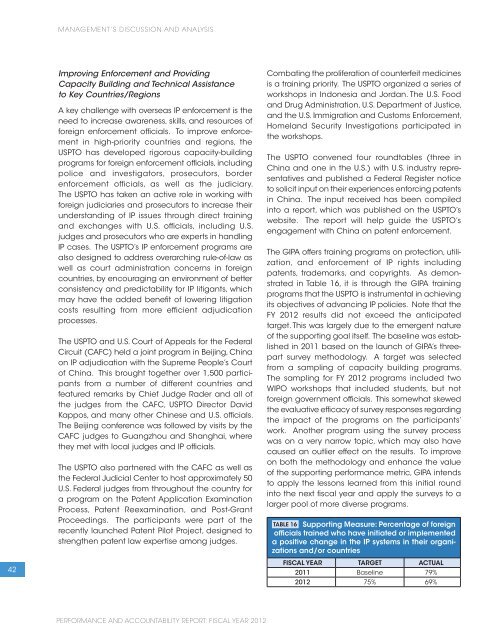
![Printable version [PDF] - United States Patent and Trademark Office](https://img.yumpu.com/51835259/1/184x260/printable-version-pdf-united-states-patent-and-trademark-office.jpg?quality=85)
